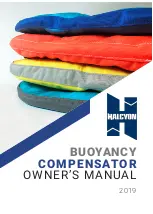
HPLC-Chip Cube Interface User’s Guide
3
In This Guide…
This manual gives an introduction to HPLC-Chip technology
and explains how to install, maintain and troubleshoot you
HPLC-Chip Cube.
1
Introduction to HPLC-Chip Technology
2
3
4
5
6
7
Consumables and Maintenance Parts
Appendix A
Summary of Contents for 1260 Infinity
Page 1: ...Agilent 1260 Infinity HPLC Chip Cube Interface G4240A User Manual ...
Page 4: ...4 HPLC Chip Cube Interface User s Guide ...
Page 8: ...8 HPLC Chip Cube Interface User s Guide Contents ...
Page 52: ...52 HPLC Chip Cube Interface User s Guide 4 Installation Chip Cube Hardware Installation ...
Page 95: ......




































